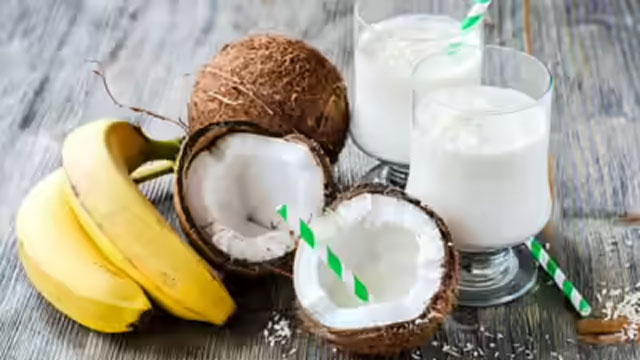Health
Kidney Patients Urged to Avoid Coconut and Banana Together

Medical experts have issued a critical warning for kidney patients, advising them to avoid consuming coconut and banana together due to the risk of dangerously high potassium levels in the blood. This alert follows a statement from Dr. Parwez of the All India Institute of Medical Sciences (AIIMS) in New Delhi, who emphasized that this combination can lead to hyperkalemia, a condition that can result in irregular heartbeats and, in severe cases, cardiac arrest.
Understanding the Risks of Potassium Overload
The kidneys play a vital role in regulating potassium levels in the body. When kidney function is compromised, as is often the case for patients with chronic kidney disease, the body struggles to eliminate excess potassium. Foods rich in potassium, such as bananas and coconut, can present a significant health threat in these situations.
A single banana contains approximately 450 mg of potassium, while both coconut water and coconut flesh also contribute substantial amounts of this mineral. The combination of these two foods can lead to potassium levels exceeding safe thresholds, putting kidney patients at risk.
Dr. Parwez noted that even moderate consumption of these fruits could push potassium levels into dangerous territory. Symptoms of potassium overload, including fatigue, nausea, and muscle cramps, often do not manifest until the condition has progressed significantly. As a result, many kidney patients may remain unaware of their elevated potassium levels until they experience severe complications.
Preventative Measures for Kidney Health
Health professionals are urging kidney patients to completely avoid the combination of coconut and banana to mitigate the risk of hyperkalemia. The cumulative effects of high-potassium foods can lead to life-threatening health issues, even if symptoms do not appear immediately.
The importance of dietary management cannot be overstated for those with compromised kidney function. It is essential for patients to remain vigilant about the foods they consume, understanding that certain combinations can have unforeseen consequences on their health. By adhering to these dietary recommendations, kidney patients can better manage their condition and reduce the risk of serious complications.
As the medical community continues to raise awareness about the dangers of high-potassium foods, individuals with kidney disease are encouraged to consult healthcare professionals about their dietary choices. This proactive approach can make a significant difference in managing their health and well-being.
-

 World5 months ago
World5 months agoSBI Announces QIP Floor Price at ₹811.05 Per Share
-

 Lifestyle5 months ago
Lifestyle5 months agoCept Unveils ₹3.1 Crore Urban Mobility Plan for Sustainable Growth
-

 Science4 months ago
Science4 months agoNew Blood Group Discovered in South Indian Woman at Rotary Centre
-

 World5 months ago
World5 months agoTorrential Rains Cause Flash Flooding in New York and New Jersey
-

 Top Stories5 months ago
Top Stories5 months agoKonkani Cultural Organisation to Host Pearl Jubilee in Abu Dhabi
-

 Sports4 months ago
Sports4 months agoBroad Advocates for Bowling Change Ahead of Final Test Against India
-

 Science5 months ago
Science5 months agoNothing Headphone 1 Review: A Bold Contender in Audio Design
-

 Top Stories5 months ago
Top Stories5 months agoAir India Crash Investigation Highlights Boeing Fuel Switch Concerns
-

 Business5 months ago
Business5 months agoIndian Stock Market Rebounds: Sensex and Nifty Rise After Four-Day Decline
-

 Sports4 months ago
Sports4 months agoCristian Totti Retires at 19: Pressure of Fame Takes Toll
-

 Politics5 months ago
Politics5 months agoAbandoned Doberman Finds New Home After Journey to Prague
-

 Top Stories5 months ago
Top Stories5 months agoPatna Bank Manager Abhishek Varun Found Dead in Well









